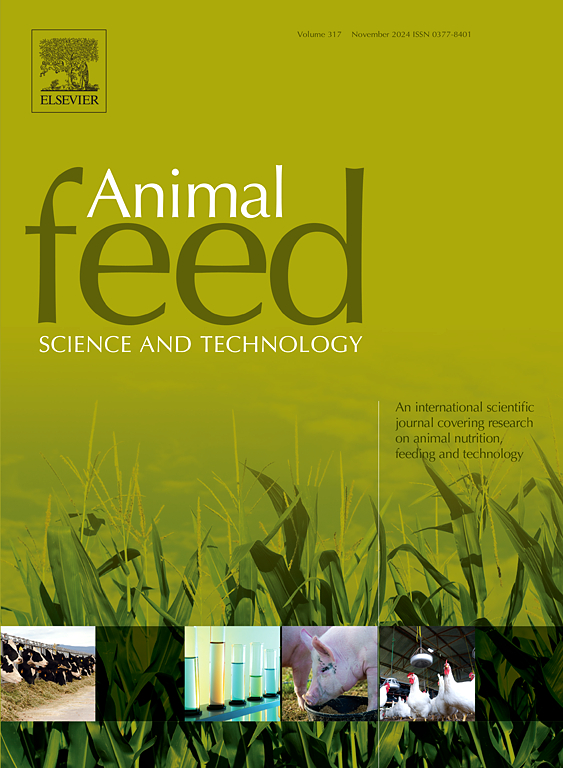低蛋白饲粮中添加色氨酸和亮氨酸对荷斯坦犊牛生长性能、消化率和血液代谢产物的影响
IF 2.7
2区 农林科学
Q1 AGRICULTURE, DAIRY & ANIMAL SCIENCE
引用次数: 0
摘要
本试验旨在探讨低蛋白饲粮中添加色氨酸和亮氨酸对断奶前犊牛生长性能和血液指标的影响。选取75头体重相近(42 ± 2.35 kg)的荷斯坦公犊牛,随机分为5组。五个治疗显示如下:积极的控制(HP)组(22 % CP),负控制(LP)组(19 % CP), L组(19 % CP + 1.15 %低浓缩铀),T组(19 % CP + 0.26 % Trp)和LT组(19 % CP + 1.15 %列伊+ 0.26 % Trp)。结果表明:1)LP组犊牛平均日增重显著低于HP、L和LT组。HP组、L组和LT组的平均日增重无显著差异。L组F/G值显著低于其他各组,其他组间差异无统计学意义。2)试验第10 ~ 34天,LP组犊牛粪便评分和腹泻率显著高于其他各组。3)低蛋白质饲粮提高了犊牛血清尿酸(UA)和尿素氮(BUN)含量。低蛋白饲粮中添加色氨酸和亮氨酸显著降低了尿酸和尿素氮含量,血清尿酸和尿素氮含量恢复到正常水平(P <; 0.05)。低蛋白质饲粮降低了犊牛血清总蛋白(TP)和白蛋白(ALB)含量。低蛋白质饲粮中添加色氨酸和亮氨酸显著提高了TP和ALB含量,并恢复到正常水平(P <; 0.05)。4)在血液激素参数方面,低蛋白饲粮显著降低了犊牛血清生长激素(GH)和IGF-1浓度,导致犊牛生长缓慢(P <; 0.05)。在低蛋白日粮中补充亮氨酸和色氨酸可以恢复这两种激素的正常浓度并促进生长。5)在血清抗氧化能力和免疫功能方面,低蛋白饲粮降低了血清超氧化物歧化酶(SOD)、过氧化氢酶(CAT)、干扰素-γ(IFN-γ)、白细胞介素-2 (IL-2)和免疫球蛋白M (IgM)含量,容易导致免疫力下降和炎症反应。低蛋白饲粮中添加色氨酸和亮氨酸可显著提高血清SOD、CAT、IFN-γ、IL-2和IgM含量(P <; 0.05),减轻炎症风险。6) LP组组氨酸(His)浓度显著低于HP组(P <; 0.05)。与LP相比,L和LT中His、亮氨酸(Leu)、苏氨酸(Thr)、总必需氨基酸和色氨酸(Trp)含量显著升高(P <; 0.05)。与LP组相比,T组和LT组血清trp含量显著升高(P <; 0.05)。综上所述,与HP(22 % CP)相比,LP(19 % CP)降低了犊牛的日增重,并对犊牛的免疫力和抗氧化能力产生负面影响。在低蛋白饲粮中添加亮氨酸(1.15 %)和色氨酸(0.26 %)可以提高日增重,提高免疫力和抗氧化能力,降低炎症因子。我们的发现强调了在低蛋白饮食中补充色氨酸和亮氨酸对优化小牛健康和生长的重要性。本文章由计算机程序翻译,如有差异,请以英文原文为准。
Effects of low-protein diet supplemented with tryptophan and leucine on growth performance, digestibility, blood metabolites of Holstein calves
The objective of this study was to evaluate the effects of low-protein diet supplemented with tryptophan and leucine on growth performance and blood parameters of preweaning calves. Seventy-five Holstein male calves with similar body weight (42 ± 2.35 kg) were randomly assigned to 5 treatments. The five treatments were showed as follows: positive control (HP) group (22 % CP), negative control (LP) group (19 % CP), L group (19 % CP + 1.15 % Leu), T group (19 % CP + 0.26 % Trp) and LT group (19 % CP + 1.15 % Leu + 0.26 % Trp). The results showed that:1) The average daily gain (ADG) of calves in LP group was significantly lower than that in HP, L and LT group. And, there was no difference on ADG among HP, L and LT group. The F/G value in L group was significantly lower than othergroups, and there was no difference among other groups. 2) During the trial period from day 10 to day 34, fecal scores and diarrhea rates LP group was significantly higher than other groups.3) Serum uric acid (UA) and blood urea nitrogen (BUN) content were increased in calves fed low protein diets. Supplementation of tryptophan and leucine in low protein diets significantly reduced UA and BUN content and serum restored to normal concentration(P < 0.05). Serum total protein (TP) and albumin (ALB) contents of calves fed low protein diets were reduced. Supplementation of tryptophan and leucine in low protein diets significantly increased TP and ALB contents and restored to normal concentration(P < 0.05). 4) In blood hormone parameters, serum growth hormone (GH) and IGF-1 concentration were significantly reduced in calves fed a low-protein diet resulting in slow growth(P < 0.05). Supplementation of leucine and tryptophan in the low-protein diet restored normal concentration of these two hormones and promoted growth. 5) In serum antioxidation capacity and immunity function, serum super oxide dismutase (SOD), Catalas (CAT), interferon-γ(IFN-γ), interleukin-2 (IL-2) and immunoglobulin M (IgM) content were decreased in calves fed low protein diets, which easily led to decreased immunity and inflammation. Supplementation of tryptophan and leucine in low protein diet significantly increased serum SOD, CAT, IFN-γ, IL-2 and IgM contents (P < 0.05) and alleviated the risk of inflammation. 6) The concentration of histidine (His) in LP were significantly lower than those in HP (P < 0.05). Compared with LP, the contents of His, leucine (Leu), threonine (Thr), total essential amino acids and tryptophan (Trp) in L and LT increased significantly (P < 0.05). SerumTtrp content in T and LT were significantly increased compared with group LP (P < 0.05). In summary, compared with HP (22 % CP), LP (19 % CP) reduced the daily weight gain of calves and had a negative effect on the immunity and antioxidant capacity of calves. The supplement of leucine (1.15 %) and tryptophan (0.26 %) in low protein diet could increase the daily weight gain, improve immunity and antioxidant capacity, and reduce inflammatory factors. Our finding highlights the importance of tryptophan and leucine supplementation in low-protein diets to optimize calf health and growth.
求助全文
通过发布文献求助,成功后即可免费获取论文全文。
去求助
来源期刊

Animal Feed Science and Technology
农林科学-奶制品与动物科学
CiteScore
6.00
自引率
6.20%
发文量
266
审稿时长
3 months
期刊介绍:
Animal Feed Science and Technology is a unique journal publishing scientific papers of international interest focusing on animal feeds and their feeding.
Papers describing research on feed for ruminants and non-ruminants, including poultry, horses, companion animals and aquatic animals, are welcome.
The journal covers the following areas:
Nutritive value of feeds (e.g., assessment, improvement)
Methods of conserving and processing feeds that affect their nutritional value
Agronomic and climatic factors influencing the nutritive value of feeds
Utilization of feeds and the improvement of such
Metabolic, production, reproduction and health responses, as well as potential environmental impacts, of diet inputs and feed technologies (e.g., feeds, feed additives, feed components, mycotoxins)
Mathematical models relating directly to animal-feed interactions
Analytical and experimental methods for feed evaluation
Environmental impacts of feed technologies in animal production.
 求助内容:
求助内容: 应助结果提醒方式:
应助结果提醒方式:


